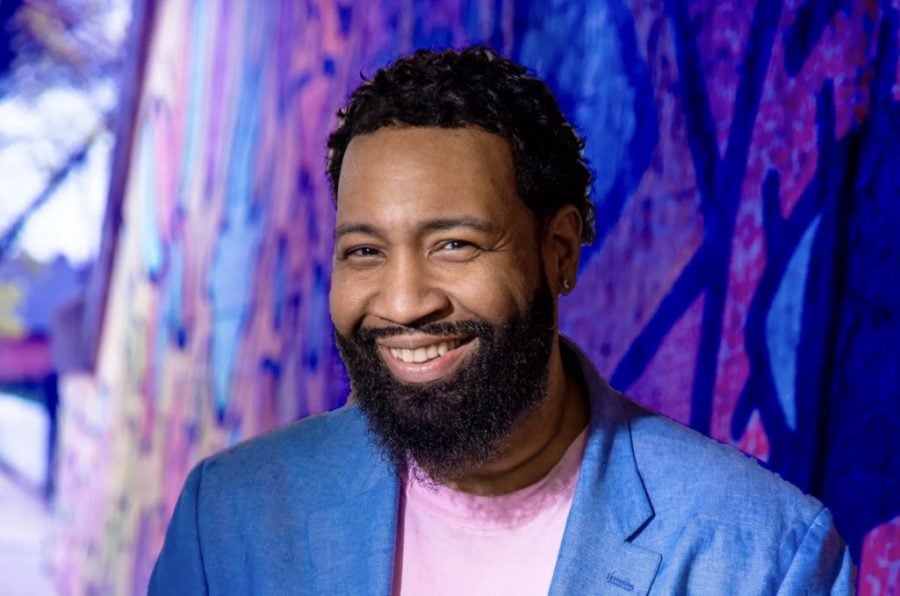Q&A: ETHS teacher Kamasi Hill talks developing the AP African American Studies curriculum
Kamasi Hill. The Evanston Township High School history teacher helped shape the AP African American Studies curriculum.
February 24, 2023
When Evanston Township High School history teacher Kamasi Hill heard the College Board was developing an AP African American Studies curriculum, he knew he wanted to get involved.
So, he reached out to an administrative team at the College Board. He began working as a member of the 13-person committee developing the course early last year, sourcing primary documents, creating exam questions and training teachers.
But in January and early February of this year, the class became a matter of nationwide controversy after Republican Florida Gov. Ron DeSantis criticized parts of the curriculum — including units on movements led by women, intersectionality and Black Lives Matter — and the College Board released a new framework making those subjects optional.
The Daily spoke with Hill about conservative pushback, curriculum development and teaching an AP African American Studies pilot class at ETHS.
This interview has been lightly edited for brevity and clarity.
The Daily: What did you take care to include in the curriculum?
Hill: Two of the issues that I feel like always kind of get the short end of the stick in terms of representation and adequate space for examination has been art and African American religion. So I wanted to make sure that the course reflected the full scope of the African American experience — in particular, African American art and African American religion.
The Daily: What moments have stood out to you as you’ve been teaching the course?
Hill: Hearing the students tell me how the curriculum shows up in other classes. So I hear, “Oh, we learned this and we did this in art” or “We did this in cooking” or “We did this in” — whatever. Because it’s an interdisciplinary course, the students are seeing how it shows up. Those are the moments that really stand out, when those kinds of light bulb moments go off for students and they’re able to see that this is not simply an AP course that they’re learning about. It shows up in different facets of their academic and personal life.
The Daily: How have you navigated some of the national pushback, especially in Florida, surrounding the AP African American Studies curriculum?
Hill: The first thing I’ve done is I’ve protected my kids. I don’t want the media to be contacting them. I didn’t want them to feel like there was something wrong with the course. So I just wanted to make sure that the kids were fully aware on what the class is all about.
The second thing is, for me, as a historian, I realize that when it comes to Black studies, Africana Studies, African American Studies, it’s always been a fight for representation, for inclusion in curriculums. And, you know, even fights at the state and federal level to ensure that the contributions and history of African Americans are included. So it’s not surprising that this class is a fight because there’s always been a fight.
The Daily: What was the process of bringing together the whole curriculum?
Hill: A lot of discussion, a lot of editing. It’s just a lot of preparation. You’re meeting, you’re talking, you’re working through things and you’re editing. I mean, history is about revision. A lot of people say, “Well, we don’t want revisionist history.” All of history is revisionist. We’re constantly revising, we’re constantly evaluating, we’re constantly analyzing.
The Daily: In Florida, Gov. DeSantis criticized subjects in the curriculum like queer theory and Black feminist theory. How did you want to incorporate curriculum topics like that?
Hill: Those are secondary sources that will always be a part of the conversation. Primary curriculum is all primary source material. Supplemental materials like queer theory and intersectionality, all that stuff, can always be included, but aren’t primary sources that are a part of the everyday curriculum.
The students do have a project that they have to complete, and they’re able to choose any subjects that they’d like within the curriculum, as well as the secondary source materials. So they’ll have access to the challenging and controversial material that the state of Florida has deemed problematic.
Email: [email protected]
Twitter: @avivabechky
Related Stories:
— ETHS teacher who shaped AP African American Studies discusses threats to curriculum
— ETHS staff say the school teaches about reparations. Some students say they haven’t learned enough.
— District 202 Board of Education discusses equity of AP enrollment, access


